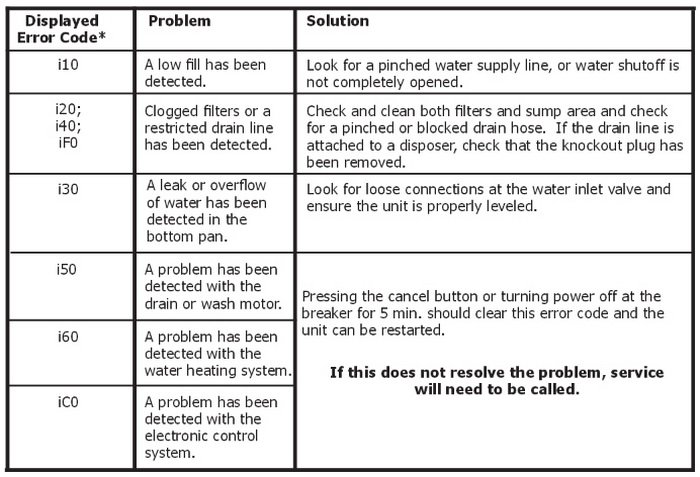
Think of the heating element as the heart that pumps warmth into the dishwasher system. When it falters, it’s like trying to wash dishes in cold water or taking a bath in a frigid shower. Not ideal, right? The first thing you might notice is that your dishes aren’t as clean as usual, or they might still be wet at the end of a cycle. So, what’s the next step for someone who’s never dealt with this before? Let’s dive deeper into understanding this problem, discover when it’s time to call in a professional, and explore what you might be able to do on your own before reaching for the phone.
Understanding What the “HE” Error Code Means
The “HE” error code stands as a sentinel, warning you that the heating element might not be doing its job effectively. In a dishwasher, a functioning heating element is critical for several reasons. It primarily heats the water to ensure that detergent dissolves correctly and that your dishes are sanitized at a high temperature. Imagine trying to dissolve sugar in cold tea—it just doesn’t mix well.
When this error code appears, the dishwasher’s brain is essentially telling you, “Hey, something’s wrong with my heating system!” It might be due to a faulty heating element, which acts like a radiator in your car, or it could be an issue with the thermostat or control board, which are like the nerve centers deciding when and how much heat to apply. Another possibility is a wiring problem, where the signals are just not getting through, much like a phone call that keeps dropping.
So, what triggers this problem in the first place? Over time, sediment and mineral buildup can coat the heating element, much like the lime and rust that can crust over your kitchen faucet. This can diminish its effectiveness. Electrical faults with wires can also spark this error, and sometimes, a software glitch in the control board might be the culprit. We’re dealing with a mix of mechanical and electronic issues, and that can be daunting. But understanding the basics of what might be going wrong helps you decide whether this is a DIY fix or a job for a professional.
DIY Troubleshooting: What You Can Try First
Before you jump straight to calling a technician, there are a few things you might want to try on your own. These steps are simple and safe, requiring no special tools beyond what you likely have at home. Firstly, make sure the dishwasher is unplugged or the circuit breaker is off to ensure safety—electricity and water are a dangerous mix!
Next, check the heating element for visible signs of wear or buildup. Grabbing a flashlight, peer into the depths of your dishwasher—does the heating element look white or chalky? This buildup could be insulating the element, preventing it from doing its job. You can clean it gently with a mixture of vinegar and water, much like you’d descale a coffee maker.
If that doesn’t seem to be the issue, reset the dishwasher. Much like rebooting a computer, a simple off-and-on might clear a temporary glitch. Follow your manual to reset the machine effectively. Still seeing that error code? Now’s a good time to consider the next steps, as we’ve exhausted the easy fixes.
When to Call a Professional Technician
If the error persists despite your best efforts, it might be time to call in the cavalry. A professional technician will have the right tools and expertise to deal with complex issues like wiring or control board failures, which are comparable to the brain and nervous system of the machine. Attempting to fix these without proper know-how is like trying to perform intricate brain surgery with just a spoon—definitely not recommended.
Some signs that it’s time to call a professional include a persistent error code despite resets, visible damage to the heating element, or if you’re simply not comfortable working with electrical components. A technician can perform diagnostic tests, replace faulty parts, and ensure that the machine is safe to use going forward.
Finally, consider this a learning opportunity. Ask the technician for tips on maintenance and prevention to avoid future problems. This interaction can be a wealth of knowledge, helping you become more confident in handling minor issues yourself. After all, while calling in a pro is sometimes necessary, understanding your appliance better equips you to get the most out of it.
Prevention Tips to Avoid Future “HE” Error Codes
Once your dishwasher is back up and running, you’ll want to keep it that way. A little preventative maintenance goes a long way in avoiding the “HE” error in the future. Regular cleaning of your dishwasher’s interior, including the heating element, with a vinegar rinse can prevent mineral buildup. Just run an empty cycle with a couple of cups of vinegar every few months to keep things pristine.
Keep an eye on the types of detergent you’re using as well. Some detergents can contribute to residue buildup if not properly dissolved, which can be mitigated by ensuring the water heats properly. It’s also a good idea to run hot water in your sink before starting the dishwasher cycle—this ensures that the incoming water is already warm, helping the heating element to maintain the correct temperature more easily.
Lastly, always give a quick check for kinks or bends in the wiring around the dishwasher. Loose or damaged wiring can be caught early with a simple visual inspection every few months. By keeping these tips in mind, you’ll extend the lifespan of your dishwasher and save yourself headaches down the road. Remember, a well-loved appliance is a well-maintained one!